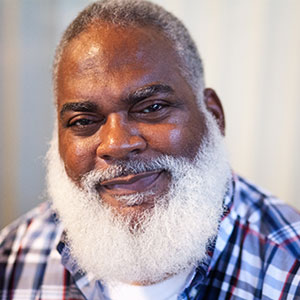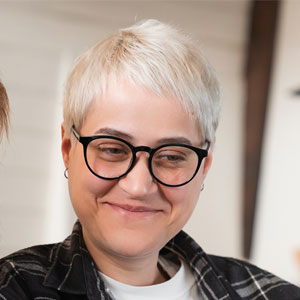Solution Focused Brief Therapy Group
Following is the Solution Focused Brief Therapy meeting calendar. Select the session title you are attending today.
Meet the Group
Your preceptor, Scott Satti, is contracted to provide psychotherapy in a rural community. He has invited you to join him at an ongoing, open, solution-focused therapy group for people with addictions.
Scott starts today's session by introducing himself and solution focused brief therapy groups.
Scott’s Introduction TranscriptIntroductions
The group members go around the room introducing themselves.
Marquis

“My name is Marquis, and I’ve been taking pain pills for my back and my wife noticed that recently I’ve been using 30-day supply in two weeks. I’m 56, but I’ve been feelin’ like 76 due to the pain. I use he/him and they/them pronouns. I’ve been coming for about a month now.”
Frances

“I’m a lifelong cocaine user, but it never interfered with life, but then I recently had a heart attack. My cardiologist said if I keep smoking it, I won’t live to see 45. And I’m 44. I use she pronouns? Like, what else would I use? I’m Frances, but you can call me Frankie. It’s my first time.”
Brea

“I’m Brea; that’s spelled b-r-e-a but pronounced ‘bree.’ Not telling you how old I am. It’s none of your all’s damn business. I only smoke weed, and I need a job, but I can’t pass any drug screen cuz I can‘t stop using it. I’m a woman. It’s my first time here.”
Jason

“I’m Jason and I’m 40. As you can see, I’m a guy. Drink maybe five or six nights a week and my gout is flaring up. My PCP said he won’t refill my gout medication until I get my drinking under control. I thought only old guys had gout. This is my, let me count, 1, 2, 3, 4. Four times.”
Jade

“Jade here, she, her, hers, 26 years old. My nurse practitioner said she won’t give me anymore Xanax until I get help. So I started buying them off the street. And then I thought…maybe I have a problem. This is my second meeting.”
Liam

“I’m Liam. Katerina, my partner, she said that she’ll leave if I don’t get my drinking under control. I tried on my own and can’t. This is my third session.”
Linn

“Linn. Alcohol’s my problem, too. My daughter won’t let me watch my grandbabies because she smelled alcohol on my breath. I’m 39. This is my first time.”
Maricela

“I was caught driving cross state lines with meth on me. They will knock down my charge if I remain sober. Oh, I’m Maricela, and if Linn’s 39, then I’m 29! Cuz I really am 39. And I’ve got a grandkid I haven’t even met because I don’t know where my kids are livin’. They won’t tell me. I been in therapy lots before, but this is my first time here.”
Kaz

“Kaz. 25. I got a DUI an’ they gave me court-mandated treatment. He pronouns, as if you couldn’t tell.”
Valeria

“Valeria here, 34. I had a DWI the other month and the court said I had to get treatment. This is my second meeting. I am not an addict; it was only weed.”
After Valeria finishes, Kaz speaks up. “So, Scott, how about you? Have you ever struggled with addiction?”
What is Scott’s best answer to this question?
This is not a good choice.
Too little self-disclosure: If you try very hard to maintain stereotyped role expectations and keep yourself mysterious by hiding behind your professional facade, you can lose your personal identity in the group and allow very little of yourself to be known.
This is not a good choice.
Too much self-disclosure: Most beginning group leaders (and many experienced ones) have a strong need to be approved of and accepted by group members. It is easy to make the mistake of “paying membership dues” by sharing intimate details to prove that you are just as human as the members.
This is a good choice.
Appropriate, facilitative self-disclosure is an essential aspect of the art of group leading. It is not necessary to disclose details of your past or your personal life to make yourself known as a person or to empathize with the participants. A few words can convey a great deal, and nonverbal messages—a touch, a look, a gesture—can express feelings of identification and understanding.
Maricela Gives Advice

After Kaz’s interruption, Scott asks the new group members, “Ok then, I want you to think for a few minutes about what you want to get from this group. I know each of you has strengths and resources, such as resilience, courage, and ingenuity. You might recognize some of these already or you might need to figure some of them out. Each of you is in a different place in your addiction or recovery and that’s fine. This isn’t about the person next to you and what they say. It’s about your solutions and your goals. What will be different in your life when this problem is no longer prominent, has become irrelevant, or has even disappeared?”
After a few minutes of quiet, the group members give a brief statement on their goals for the group and the next session. As they do this, Maricela interjects advice to others several times.
What should Scott do after the third such statement of advice from Maricela?
This is not a good choice.
It is the leader’s task to make sure that such “problem-solving interventions” do not become a pattern; they may cause enough irritation in other members to precipitate a confrontation with those who are quick to offer remedies for everyone’s troubles.
This is a good choice.
It is the leader’s task to make sure that these “problem-solving interventions” do not become a pattern; they may cause enough irritation in other members to precipitate a confrontation with those who are quick to offer remedies for everyone’s troubles.

Scott works to establish goals with each new group member and gets updates on continuing goals for the others. “As we close, think about what you might do before we meet next time to keep your problems smaller. For instance, you could use a rating scale each day. See you in a week, my friends!”
This session is over. You can return to the calendar with the button in the lower right or to the course.
Linn
Before the next session begins, Linn arrives early and tells Scott she needs to talk privately with him. You are close enough to hear their interaction.
Linn

“It’s been, uh, well, that is, it had been a few weeks since I’d had a drink and Maya said I could babysit this coming weekend. But last night, I started thinking about how maybe all the kids would be too much, and what if something happened, and then Maya wouldn’t let me do it again? And then I thought maybe just one drink would calm me down. And well, I had more than just one drink. And I don’t want Maya to find out. Some of the kids in this group, Brea and Kaz, they went to high school with Maya. They are all the same age—same grade and everything. I’m afraid to say anything in group because it might get back to Maya that I drank again. I can’t have her finding out. They aren’t close or anything, but this isn’t a big city, you know.”
Scott replies, “Linn, people here care about you. Nobody would share things that happen in group, right? Did something happen in your childhood that makes you want to not trust others?”
Scott speaks again.
“Wait a minute, let me step back, my friend. In this group, we encourage members to express their concerns and fears by talking directly to each other. Rather than tell me that you are afraid Brea or Kaz will talk to your daughter, you should talk directly to them, and probably the whole group. In addition, what do you think about talking with your daughter about the relapse? How can the two of you focus on building trust and finding a solution?”

This session is over. You can return to the calendar with the button in the lower right or to the course.
Responding to Members
Responding TranscriptValeria

Valeria starts in, “My baby’s daddy left me with these damn kids, and I’m gonna have to move back into my mom’s shitty 1-bedroom rathole. You know how I went out for my birthday, got that DUI, and now I’m facing eviction? I can’t get into any other housing cuz of my drug conviction. It was just weed. I don’t know why that still matters. And I also have a felony from when I stole $300 from a Subway two years ago. Nothing will ever get better for me.”
How should Scott respond to Valeria?
This is not a good choice.
This would use a psychodrama approach in which you would be trying to explore the group member’s creativity in exploring life, expanding oneself, and in coping with life.
This is a good choice.
Positive psychology concentrates on what is right and what is working for people rather than dwelling on deficits, weaknesses, and problems. This is appropriate to use in a solution-focused brief therapy group.
This is not a good choice.
Scott gives false reassurance, overshares, and provides solutions instead of helping Valeria find her own solutions.
Engaging Kaz?
As the group continues, you notice that Kaz does not seem engaged today. He has been late to several sessions, left at least one session early, and skipped last week entirely. You catch him after the group ends and ask Kaz how he feels group is going.
Kaz

Kaz responds, “Hey, I’m just tryin’ to get this therapy thing completed, so I get the papers signed, so then I’ll be off my fucking probation.”
Scott steps in to respond. What is Scott’s most appropriate response?
This is not a good choice.
This statement focuses on the substance abuse and not looking at living a healthier and happier life. Also, group leaders in SFBT groups should have a cooperative stance with participants, not a combative one.
This is not a good choice.
While using Kaz’s language can show empathy, it is not an appropriate therapeutic response in a SFBT group. Also, group leaders in SFBT groups should have a cooperative stance with participants, not a combative one.
This is a good choice.
This statement does not directly focus on stopping addictive behaviors and focuses more on enhancing preventative factors in Kaz’s life. This may help Kaz be more motivated to change.
Liam Speaks to Scott After Session
After the session, Liam pulls Scott aside while waving a piece of paper.
Liam

“Hey Scott. I got charged $150 for last week’s session. I called my insurance company and they said I only got six weeks of group therapy and it ran out already. I think it’s really helping, and I don’t want to stop, but they said they wouldn’t pay anymore. What can I do?”
This session is over. You can return to the calendar with the button in the lower right or to the course.
Which Track are They On?
Which Track TranscriptJason

“I have been sober for three weeks and I have a doctor’s appointment next week to start back up on my gout medication. My doctor is going to be so proud of me!”
Maricela

“I am still struggling to maintain sobriety, so I started this week to go to group or AA every day.”
Frances

“I’m still using, but it is significantly less. I am taking each day one at a time and trying to use my coping skills.”
Jade

“Therapy and Lexapro ain’t helping my anxiety. I told ya I tried almost every street drug and Xanax is the only thing that helps.”
Linn

“My daughter will still not let me watch my grandbabies alone, so I asked her if I can watch them at her house while she does housework or just reads or watches tv in another room.”
Kaz

“I still don’t think I have an addiction, but I’m starting to see that I do need to make changes in my life. Notice I got here on time today.”
Marquis

“I‘m still struggling with pain. I live in constant pain. I just signed up for physical therapy and I’m going to give acupuncture a try.”
Valeria

“That lousy landlord is still being a jerk. I know I haven’t paid rent the past three months, but I offered to pay this month, and he still gave me an eviction notice.”
Brea

“Until I had to write it down, I didn’t realize how much I was smoking. I was able to make the decision to not smoke each day, and I haven’t felt this clear-minded in a long time. Also, I passed a drug screen and I start my new job next week!”
Which two group members are still on the problem track, instead of the solution track?

Scott comments, “From what they said in group today, Valeria and Jade are concentrating on problem-saturated stories. How can we help them move in a positive direction? How can we encourage them to experiment with doing something different?”
Scotts calls for a break and asks Valeria and Jade to speak with him briefly.
“My friends, I’ve been listening to each of you talk about your updates. I’ve noticed that both of you appear to still be stuck on ‘these are my problems.’ This group should be helping you focus on solutions to your problems. Think about your statement, Valeria, about your landlord being a jerk. How can you reframe that to changing the relationships with your landlord, or finding resources to pay the rent, or such? That is, here is the problem, what is the solution?
“Same with you, Jade. You are focusing on your anxiety and on not being able to get the drug you think you need. What other solutions could you use to treat anxiety? Let’s not just look at one addictive, habit forming solution. What are other solutions—individual therapy, maybe antidepressants, have you heard about meditation apps?
“Let’s work on reframing your thoughts, my friends. Your group mates are here to help guide you in reframing your thoughts so you can handle these situations better. What do you think? Can you work on this with us?
“I’ve been listening to each of you talk about why you are here today. I appreciate you for taking the step in coming to this group to make things better for you. For a change of pace, let’s talk about the times before your problem started to interfere in your life. What were you doing at those times that kept the problem at bay?
“You have talked about times when the problem bothered you less. Now let’s consider what you might do before we meet next time to keep these problems smaller.”
This session is over. You can return to the calendar with the button in the lower right or to the course.
Concerning Behavior
Before, during, and after another group session, you notice the following. Which of them are concerning? Why?

You talk with Scott about your concerns regarding Valeria and Brea’s behavior as well as what Kaz said. He asks you how you would address it. He reminds you that in SFBT group, leaders have the tasks of setting limits, establishing group rules, informing members of their rights and responsibilities, and protecting members. In particular, he notes that as the leader, he disavows the role of expert, preferring a more collaborative stance.
This session is over. You can return to the calendar with the button in the lower right or to the course.